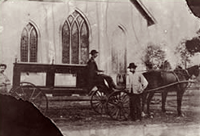
CDC Ebola Emergency Partners Newsletter
CDC has activated its Emergency Operations Center to respond to Ebola. Below, please find resources and guidance that we hope will be useful to you and your organization. Please share with your colleagues and networks.
In this email:
- Announcements
- CDC Ebola Key Messages
- Ebola Cases and Deaths (West Africa)
- Ebola Partner Resources
- Winter Weather Tips
- CERC Corner
- Stay Connected
- Contact Us
Announcements

Addressing the Needs of Contacts of Ebola Patients
Contact tracing is an essential tool for responding to epidemics. Training of public health responders focuses almost exclusively on the technical aspects of contact tracing, and little on issues experience by contacts themselves – issues that might prevent or impede the tracing process. Addressing these issues helps ensure contacts’ compliance with tracing, monitoring, and quarantine. It requires recognition of contacts’ unique cultural, linguistic, socioeconomic, educational, and mental-health needs. It’s striking that even in the U.S., needs of contacts were substantial. These included food, medicine, child care, addressing stigma, transportation, housing, educational needs, financial assistance, translation services, and emotional and spiritual support.
During the response to the Ebola epidemic, both in the U.S. and in West Africa, CDC contact-tracing teams found it necessary to partner with businesses, schools, charitable foundations, community and faith-based organization, non-government organizations, and mental health resources. Linkage to these resources and anticipation of contacts’ needs should be part of the contact-tracing planning process and incorporated into emergency preparedness.
The bottom line is that anticipation of contacts’ needs, and linkage to resources to address these needs, should be part of the planning process – that is, organized before an emergency rather than ad hoc during a response. Repeatedly we find in public health that we are most effective – and often can only be effective – when we care for patients and contacts as the true VIPs of a program.
Read more on this topic in the MMWR Article here: Addressing Needs of Contacts of Ebola Patients During an Investigation of an Ebola Cluster in the United States — Dallas, Texas, 2014 Charnetta L. Smith, MD, Sonya M. Hughes, MPH, Mateusz P. Karwowski, MD, et al. MMWR Morb Mortal Wkly Rep 2015;64:121-3
|

Now Available: Emergency Department Ebola Preparedness Training Videos
CDC and the Johns Hopkins Armstrong Institute for Patient Safety and Quality collaborated with numerous professional organizations to develop an Ebola Preparedness Training for emergency department personnel.
This training is made up of four modules that showcase the important planning processes, provider-patient communication techniques and cross-discipline teamwork principles that can be used to successfully handle several emerging diseases.
The four video modules are available as a YouTube playlist: Ebola Emergency Department Preparedness or on CDC’s Ebola Website.
|
CDC Ebola Key Messages
CDC released the latest Key Messages for the Ebola Virus Disease in West Africa on February 25, 2015. To access these Key Messages, click here.
Please note that the CDC Ebola Key Messages, and this newsletter, will be distributed bi-weekly unless there are urgent updates that need to be released.
Ebola Cases and Deaths (West Africa)
As of February 21, 2015*
- Total Cases: 23539
- Laboratory-Confirmed Cases: 14134
- Total Deaths: 9541
Updates on cases and deaths can be found on the CDC website.
*Case counts updated in conjunction with World Health Organization updates and are based on information reported by the Ministries of Health.
Ebola Partner Resources
General Outbreak Information
- What’s New
- Ebola Virus Disease home page in English, French, and Spanish
- Questions and Answers on Ebola
- World Health Organization Disease Outbreak News
New or Updated Guidance Documents
(Full range of guidance documents can be found at the CDC Ebola Web site)
- Questions and Answers about Ebola for U.S. Businesses, Employers, and Business Travelers (NEW)
- Preparing Healthcare Workers to Work in Ebola Treatment Units (ETUs) in Africa: Training Toolkit Announcement (NEW)
- Ebola Preparedness: Emergency Department Training Modules (NEW)
Multimedia Resources
- Outbreak Response Photos
- Ebola Radio Health Messages in Local Languages
- Communication Resources (UPDATED)
- Outbreak Map (UPDATED)
- Digital Press Kit (UPDATED)
- Ebola Community Education Tool Kit
- CDC Videos on Ebola
- CDC In the News
Conference Calls and Webinars

Partnering with Members of the West African Community - CDC is pleased to present the third call in this bi-monthly call series for audiences with ties to West Africa and members of the West African community, held on the 2nd and 4th Tuesdays of the month, using the call information below:
The next call in this series will be held on Tuesday, March 10 from 2-3 pm Eastern Time.
Call participants are encouraged to dial in at least 15 minutes before the call and to email questions toEmergencyPartners@cdc.gov ahead of the call.
Please send any suggestions on topics and speakers or any other feedback you have on these calls to EmergencyPartners@cdc.gov.
To access the transcripts, audio recordings, and resources from this call series, please visit:http://www.cdc.gov/vhf/ebola/
|
Content Syndication
Put CDC content on Ebola on your website that will update automatically.
Add a CDC Ebola Microsite to your web page. The embed code for this microsite is available in CDC’s new syndication site, the Public Health Media Library. Ebola HTML content, images, and other media are being added and also available for syndication from this site.
Please contact IMTech@cdc.gov for technical support.
Winter Weather Tips
 |
Stay safe and warm during winter weather.
Whether you are experiencing unusually cold temperatures for your area, or a particularly snowy winter, CDC’s Winter Weather Web page has tips to promote your personal health and safety. Learn about hypothermia, frostbite, avoiding carbon monoxide poisoning, and more: http://emergency.cdc.gov/
|
CERC Corner


The Pandemic Influenza Storybook can help emergency planners re-energize their efforts to fight influenza and combat preparedness fatigue and apathy. First-person and family accounts provide readers with an intimate, personal view of the 1918 pandemic that goes beyond the staggering statistics associated with the event. The storybook examines the impact pandemic flu events have had on both survivors and the loved ones of those who lost their lives. Some stories will move you, some will make you laugh, and all serve as reminders of the primary reason why preparedness is so important – saving human lives. To access the Pandemic Influenza Storybook, please visit http://www.cdc.gov/
|
Stay Connected
 | Twitter:Facebook: |
Contact Us
Email: EmergencyPartners@cdc.gov
Centers for Disease Control and Prevention
1600 Clifton Rd Atlanta, GA 30333 Questions? |  |
댓글 없음:
댓글 쓰기